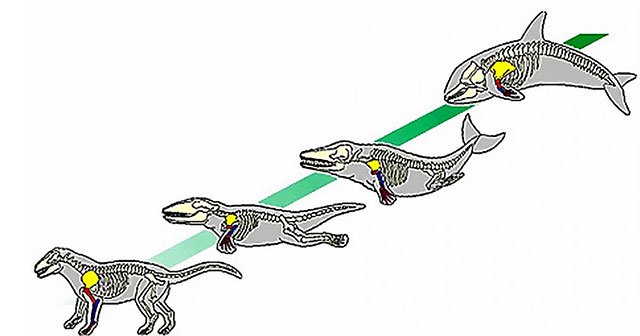9 astonishing facts about dolphins
Dolphins are familiar animals to most of us. Dolphins are famous for their remarkable intelligence, loveliness, and affection for humans. However, there are still many mysteries about this animal that we are not thorough. Here are 9 amazing facts about dolphins that not everyone knows.
1. Dolphins evolved from a terrestrial animal
Millions of years ago, the ancestors of the dolphins did not swim underwater as we know it today, but rather a completely terrestrial predator. However, about 50 million years ago, a mysterious incident happened that forced them to adapt to the underwater environment, and gradually evolved into a current mammal.
Evidence of this evolutionary history can still be seen in dolphins today. In fact, dolphins and adult whales all have mammalian finger and toe bones, but are surrounded by flesh in the form of anterior and posterior fins.
 The evolution of dolphins
The evolution of dolphins 2. Dolphins may not sleep for weeks
A recently published study showed the dolphins' surprising ability: Can stay awake for days or weeks without sleep. So how do they survive without sleep?
Dolphins possess a very special sleep mechanism, they can give half of their brains to rest at a certain time when the other half is awake - a process called "Unihemispheric sleep". This special sleep mechanism not only prevents dolphins from drowning, but also allows them to stay alert to all dangers and even encourages brain development.
3. Most dolphins do not chew their food
Dolphins do not chew food, or rather they cannot chew. Dolphins' teeth develop for the purpose of clamping down on their prey. Sometimes they will shake or rub the food on the ocean floor to tear it into small pieces, making it easier to swallow.
One theory is that the dolphins' prey is mostly small fish, and they need to quickly grab their prey in their mouths before their meal can swim away. Skip chewing to make sure your prey can't escape.
 Dolphins' teeth are not suitable for chewing
Dolphins' teeth are not suitable for chewing 4. Dolphins have been serving in the Marines of many countries since the 1960s
Since the 1960s, the US Navy has been commissioning adult dolphins and training them to detect underwater targets. Instead of using their sense of smell as a dog, dolphins detect objects by echolocation. Dolphin's echolocation ability goes beyond all the technology of the time, and is still very effective in many practical situations today.
However, animal activists have long opposed the use of dolphins for military purposes.
5. Dolphins can teach each other how to use the tool
The researchers discovered that a population of dolphins living in Shark Bay, Australia, using "hunting aids" are the sponges they collected on the ocean floor to explore the fish. The fish are hiding under the sand, and passing on the use to the offspring in the school.
6. Dolphins form friendship through common interests
Researchers from the universities of Bristol, Zurich and Western Australia have found that dolphins living in the Shark Bay area form friendships based on common interest - in this case, the habit of using foam. sea to hunt. The feature of using this tool was found primarily in female dolphins, but by studying the behavior of several male dolphins with manifestations, the researchers found a new discovery: The relationship dolphins are formed through the use of general tools.
7. Dolphins call each other by their first names
Dolphins have unique names and they will respond when called. Dolphins in each population possess their own "characteristic whistles", like a name and other dolphins can use that particular whistling to attract the attention of their mates. In fact, dolphins are also an extremely social species.
This discovery has opened up entirely new questions about the level of communication and "vocabulary" of dolphins, as well as can reveal clues about the evolution of our own linguistic skills.
8. Dolphins possess excellent "teamwork" ability
A team of researchers from Bristol University recently discovered that male dolphins can work and work together as a team - an attribute previously thought to be unique to humans.
Observing the behavior of the male dolphins when they coordinated flirting with the female, the researchers found cooperation rather than competitive behavior, which is especially unusual in finding a mate in the animal kingdom.
 Dolphins also know how to work in groups
Dolphins also know how to work in groups 9. Dolphins use the toxin of their prey as "addictive substance"
We know that puffer fish has strong toxin. Obviously dolphins also know this but they use it for "zapping" purposes.
Commonly, puffer fish toxin is deadly. However, in small doses, it can act as an addictive substance. The BBC has filmed a video in which dolphins gently play with a puffer fish for 20 to 30 minutes, then hang around and do not behave "strange".
It is clear that humans are not the only species that deliberately seek stimulants to achieve a temporary state of relaxation in the nervous system. "
You should read it
- ★ 'Hunting' season and bloody 'carnage' dolphins in Taiji, Japan
- ★ 10 incredible facts about languages - how animals communicate
- ★ Did you know: people and pigs have the same skin structure, human nervous system and round worms are the same ...
- ★ Animals can be surprisingly humanoid: rats can drive, dolphins dream ...
- ★ What is the most intelligent animal on the planet besides humans?